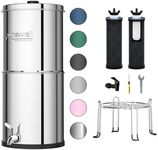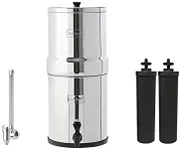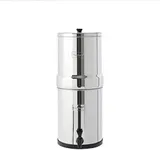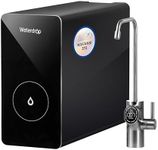Buying Guide for the Best Gravity Filters
Gravity filters are a great solution for purifying water, especially in situations where you don't have access to a pressurized water system. They work by using gravity to pull water through a filter, removing impurities and making the water safe to drink. When choosing a gravity filter, it's important to consider several key specifications to ensure you get the best fit for your needs. Understanding these specs will help you make an informed decision and ensure you have clean, safe water wherever you go.Filter CapacityFilter capacity refers to the amount of water the filter can process before it needs to be replaced. This is important because it determines how long the filter will last and how often you'll need to replace it. Filter capacities can range from a few hundred gallons to several thousand gallons. If you need a filter for occasional use, a lower capacity might be sufficient. However, for regular or heavy use, a higher capacity filter will be more convenient and cost-effective in the long run.
Flow RateFlow rate is the speed at which water passes through the filter, usually measured in liters per minute. This is important because it affects how quickly you can get clean water. A higher flow rate means you can filter water faster, which is useful if you need to purify large amounts of water quickly. For individual or small group use, a lower flow rate might be acceptable, but for larger groups or more urgent needs, a higher flow rate is preferable.
Filter TypeThere are different types of filters used in gravity filters, such as ceramic, carbon, and hollow fiber. Each type has its own advantages. Ceramic filters are durable and can be cleaned and reused, but they may have a slower flow rate. Carbon filters are good at removing chemicals and improving taste, but they need to be replaced more frequently. Hollow fiber filters are lightweight and have a high flow rate, but they can be more delicate. Consider what contaminants you need to remove and how often you want to maintain the filter when choosing the type.
PortabilityPortability refers to how easy it is to carry and set up the gravity filter. This is important if you plan to use the filter while hiking, camping, or traveling. Lighter and more compact filters are easier to carry, but they might have a smaller capacity or slower flow rate. Larger filters might be more cumbersome but can handle more water and filter it faster. Think about how and where you'll be using the filter to determine the right balance between portability and performance.
Ease of UseEase of use includes how simple it is to set up, fill, and maintain the gravity filter. This is important because a filter that's difficult to use can be frustrating and may not be used correctly, reducing its effectiveness. Look for filters with clear instructions, easy-to-fill reservoirs, and simple maintenance requirements. If you're new to using gravity filters, a model with straightforward operation will be more user-friendly and ensure you get the best performance.
DurabilityDurability refers to how well the gravity filter can withstand regular use and harsh conditions. This is important because a durable filter will last longer and be more reliable in the field. Materials like stainless steel and high-quality plastics are more durable than cheaper alternatives. If you plan to use the filter in rugged environments or for extended periods, investing in a more durable model will save you from frequent replacements and potential failures.





















